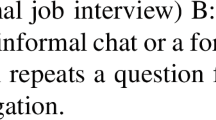Abstract
In this paper we summarize concepts from earlier work and demonstrate how infinite sequential games can be used to model strategic conversations. Such a model allows one to reason about the structure and complexity of various kinds of winning goals that conversationalists might have. We show how to use tools from topology, set-theory and logic to express such goals. We then show how to tie down the notion of a winning condition to specific discourse moves using techniques from Mean Payoff games and discounting. We argue, however, that this still requires another addition from epistemic game theory to define appropriate solution and rationality underlying a conversation.
The authors thank ERC grant 269427 for supporting this research.
Access this chapter
Tax calculation will be finalised at checkout
Purchases are for personal use only
Similar content being viewed by others
Notes
- 1.
We note that this is a simplification of SDRT which also countenances complex discourse units (cdus) and another set of edges in the graph representation, linking cdus to their simpler constituents. These edges represent parthood, not rhetorical relations. We will not, however, appeal to cdus here.
- 2.
Note that [3] considers the discounting as a function of the history rather than a constant factor which, arguably, better reflects real-life situations. We stick to a constant discounting factor here for the simplicity of presentation. The main concepts remain the same.
References
Asher, N., Lascarides, A.: Logics of Conversation. Cambridge University Press, Cambridge (2003)
Asher, N., Lascarides, A.: Strategic conversation. Semantics, Pragmatics 6(2) (2013). http://dx.doi.org/10.3765/sp.6.2
Asher, N., Paul, S., Evaluating conversational success: weighted message exchange games. In: Hunter, J., Stone, M. (eds.) 20th Workshop on the Semantics and Pragmatics of Dialogue (SEMDIAL), New Jersey, USA, July 2016 (2016, to appear)
Hintikka, J.: Language-games. In: Saarinen, E. (ed.) Game-Theoretical Semantics. Synthese Language Library, vol. 6790, pp. 1–26. Springer, Netherlands (2011). doi:10.1007/978-1-4020-4108-2_1
Asher, N., Paul, S., Venant, A.: Message exchange games in strategic conversation. J. Philos. Log. (2016). doi:10.1007/s10992-016-9402-1
Asher, N., Paul, S., Venant, A.: Message exchange games in strategic conversations. J. Philos. Log. (2016, in press)
Aumann, R.: Subjectivity and correlation in randomized strategies. J. Math. Econom. 1, 67–96 (1974)
Baltag, A., Moss, L.S.: Logics for epistemic programs. Synthese 139(2), 165–224 (2004)
Baltag, A., Moss, L.S., Solecki, S.: The logic of public announcements, common knowledge and private suspicions. Technical report SEN-R9922, Centrum voor Wiskunde en Informatica (1999)
Bernheim, B.D.: Rationalizable strategic behaviour. Econometrica 52(4), 1007–1028 (1984)
Crawford, V., Sobel, J.: Strategic information transmission. Econometrica 50(6), 1431–1451 (1982)
Dekel, E., Siniscalchi, M.: Epistemic game theory. In: Aumann, R.J., Hart, S. (eds.) Handbook of Game Theory with Economic Applications, vol. 4, chap. 12, pp. 619–702. Elsevier Publications (2015)
Franke, M.: Semantic meaning and pragmatic inference in non-cooperative conversation. In: Icard, T., Muskens, R. (eds.) Interfaces: Explorations in Logic. Language and Computation, Lecture Notes in Artificial Intelligence, pp. 13–24. Springer-Verlag, Berlin, Heidelberg (2010)
Gaiffman, H.: On local and non-local properties. In: Proceedings of the Herbrand Symposium, Logic Colloquium 1981. North Holland (1982)
Glazer, J., Rubinstein, A.: On optimal rules of persuasion. Econometrica 72(6), 119–123 (2004)
Grädel, E., Thomas, W., Wilke, T. (eds.): Automata Logics, and Infinite Games: A Guide to Current Research. LNCS, vol. 2500. Springer, Heidelberg (2002)
Harsanyi, J.C.: Games with incomplete information played by bayesian players, parts i-iii. Manag. Sci. 14, 159–182 (1967)
Kechris, A.: Classical Descriptive Set Theory. Springer-Verlag, New York (1995)
Libkin, L.: Elements of finite model theory. Springer, Heidelberg (2004)
McNaughton, R., Papert, S.: Counter-free automata. In: Research Monograph, vol. 65. MIT Press, Cambridge (1971)
Nash, J.: Non-cooperative games. Ann. Math. 54(2), 286–295 (1951)
Spence, A.M.: Job market signaling. J. Econom. 87(3), 355–374 (1973)
Venant, A.: Structures, semantics and games in strategic conversations. Ph.D. thesis, Université Paul Sabatier, Toulouse (2016)
Venant, A., Asher, N.: Dynamics of public commitments in dialogue. In: Proceedings of the 11th International Conference on Computational Semantics, pp. 272–282, London, UK, Association for Computational Linguistics, April 2015
Asher, N., Venant, A.: Ok or not ok? In: Semantics and Linguistic Theory 25. Cornell University Press, New York (2015)
Author information
Authors and Affiliations
Corresponding author
Editor information
Editors and Affiliations
Rights and permissions
Copyright information
© 2017 Springer-Verlag GmbH Germany
About this paper
Cite this paper
Asher, N., Paul, S. (2017). Conversation and Games. In: Ghosh, S., Prasad, S. (eds) Logic and Its Applications. ICLA 2017. Lecture Notes in Computer Science(), vol 10119. Springer, Berlin, Heidelberg. https://doi.org/10.1007/978-3-662-54069-5_1
Download citation
DOI: https://doi.org/10.1007/978-3-662-54069-5_1
Published:
Publisher Name: Springer, Berlin, Heidelberg
Print ISBN: 978-3-662-54068-8
Online ISBN: 978-3-662-54069-5
eBook Packages: Computer ScienceComputer Science (R0)




